高一英语必修三unit1语法教案
【——人教版高一英语】必修三unit1教案
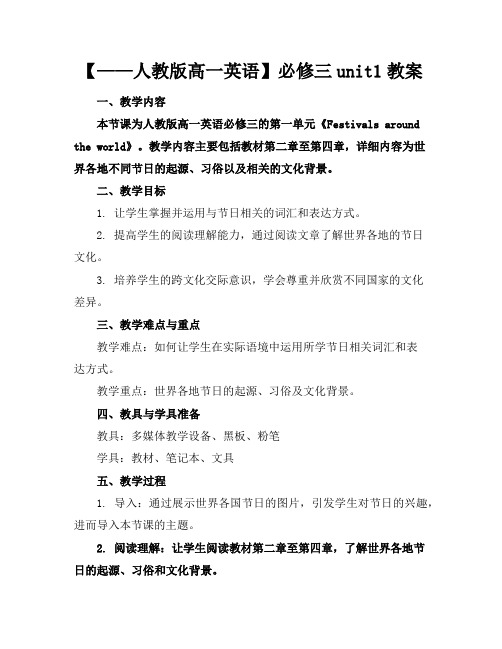
【——人教版高一英语】必修三unit1教案一、教学内容本节课为人教版高一英语必修三的第一单元《Festivals around the world》。
教学内容主要包括教材第二章至第四章,详细内容为世界各地不同节日的起源、习俗以及相关的文化背景。
二、教学目标1. 让学生掌握并运用与节日相关的词汇和表达方式。
2. 提高学生的阅读理解能力,通过阅读文章了解世界各地的节日文化。
3. 培养学生的跨文化交际意识,学会尊重并欣赏不同国家的文化差异。
三、教学难点与重点教学难点:如何让学生在实际语境中运用所学节日相关词汇和表达方式。
教学重点:世界各地节日的起源、习俗及文化背景。
四、教具与学具准备教具:多媒体教学设备、黑板、粉笔学具:教材、笔记本、文具五、教学过程1. 导入:通过展示世界各国节日的图片,引发学生对节日的兴趣,进而导入本节课的主题。
2. 阅读理解:让学生阅读教材第二章至第四章,了解世界各地节日的起源、习俗和文化背景。
3. 词汇讲解:针对阅读文章中出现的关键词汇和表达方式,进行详细讲解。
4. 实践情景引入:设置不同的场景,让学生运用所学词汇和表达方式进行角色扮演。
5. 例题讲解:针对本节课的重点内容,设计相关习题,并进行讲解。
6. 随堂练习:让学生进行小组讨论,完成教材中的练习题。
六、板书设计1. Festivals around the world2. 主要节日及文化背景3. 重点词汇和表达方式七、作业设计1. 作业题目:Write a short essay about your favorite festival and introduce its origin, customs and cultural background.2. 答案要求:不少于100词,要求条理清晰,表达准确。
八、课后反思及拓展延伸1. 反思:关注学生在课堂上的参与度,了解他们在学习过程中的困惑,及时调整教学方法。
2. 拓展延伸:鼓励学生课下搜集更多关于世界各地的节日信息,了解不同文化,提高跨文化交际能力。
【——人教版高一英语】必修三unit1教案
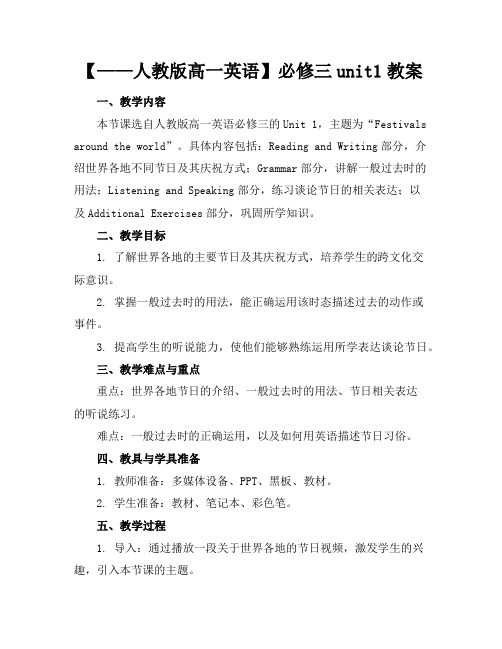
【——人教版高一英语】必修三unit1教案一、教学内容本节课选自人教版高一英语必修三的Unit 1,主题为“Festivals around the world”。
具体内容包括:Reading and Writing部分,介绍世界各地不同节日及其庆祝方式;Grammar部分,讲解一般过去时的用法;Listening and Speaking部分,练习谈论节日的相关表达;以及Additional Exercises部分,巩固所学知识。
二、教学目标1. 了解世界各地的主要节日及其庆祝方式,培养学生的跨文化交际意识。
2. 掌握一般过去时的用法,能正确运用该时态描述过去的动作或事件。
3. 提高学生的听说能力,使他们能够熟练运用所学表达谈论节日。
三、教学难点与重点重点:世界各地节日的介绍、一般过去时的用法、节日相关表达的听说练习。
难点:一般过去时的正确运用,以及如何用英语描述节日习俗。
四、教具与学具准备1. 教师准备:多媒体设备、PPT、黑板、教材。
2. 学生准备:教材、笔记本、彩色笔。
五、教学过程1. 导入:通过播放一段关于世界各地的节日视频,激发学生的兴趣,引入本节课的主题。
2. 阅读与写作:a. 让学生快速浏览课文,了解世界各地的主要节日。
c. 指导学生进行写作练习,用一般过去时描述自己最喜欢的节日。
3. 语法讲解:通过例句和练习,让学生掌握一般过去时的用法。
4. 听力与口语:a. 播放听力材料,让学生回答关于节日的问题。
b. 学生两人一组,进行节日话题的口语练习。
5. 巩固练习:完成Additional Exercises部分,检查学生对本节课知识的掌握。
六、板书设计1. Festivals around the world2. 内容:a. 世界各地节日及庆祝方式b. 一般过去时的用法c. 节日相关表达七、作业设计1. 作业题目:a. 根据课文内容,用一般过去时描述一个你了解的节日。
b. 收集更多关于节日的资料,与同学分享。
高一英语教案:必修三Unit1教案
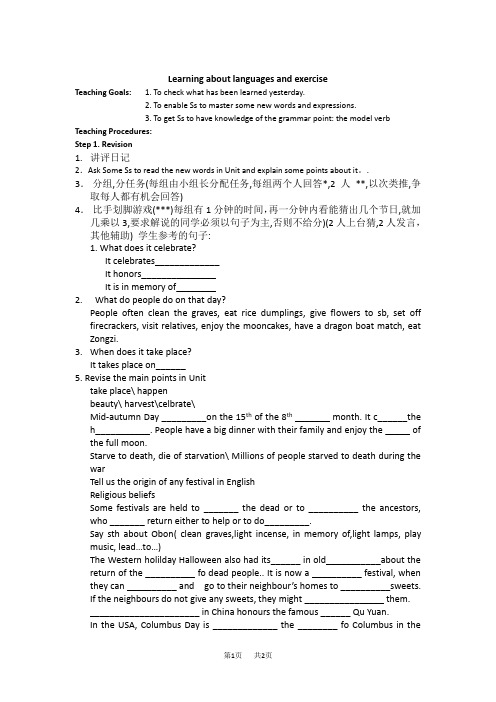
Learning about languages and exerciseTeaching Goals: 1. To check what has been learned yesterday.2. To enable Ss to master some new words and expressions.3. To get Ss to have knowledge of the grammar point: the model verb Teaching Procedures:Step 1. Revision1.讲评日记2.Ask Some Ss to read the new words in Unit and explain some points about it。
.3.分组,分任务(每组由小组长分配任务,每组两个人回答*,2人**,以次类推,争取每人都有机会回答)4.比手划脚游戏(***)每组有1分钟的时间,再一分钟内看能猜出几个节日,就加几乘以3,要求解说的同学必须以句子为主,否则不给分)(2人上台猜,2人发言,其他辅助) 学生参考的句子:1. What does it celebrate?It celebrates_____________It honors_______________It is in memory of________2.What do people do on that day?People often clean the graves, eat rice dumplings, give flowers to sb, set off firecrackers, visit relatives, enjoy the mooncakes, have a dragon boat match, eat Zongzi.3.When does it take place?It takes place on______5. Revise the main points in Unittake place\ happenbeauty\ harvest\celbrate\Mid-autumn Day _________on the 15th of the 8th _______ month. It c______the h___________. People have a big dinner with their family and enjoy the _____ of the full moon.Starve to death, die of starvation\ Millions of people starved to death during the warTell us the origin of any festival in EnglishReligious beliefsSome festivals are held to _______ the dead or to __________ the ancestors, who _______ return either to help or to do_________.Say sth about Obon( clean graves,light incense, in memory of,light lamps, play music, lead…to…)The Western holilday Halloween also had its______ in old___________about the return of the __________ fo dead people.. It is now a __________ festival, when they can __________ and go to their neighbour’s homes to __________sweets.If the neighbours do not give any sweets, they might ________________ them.______________________ in China honours the famous ______ Qu Yuan.In the USA, Columbus Day is _____________ the ________ fo Columbus in theNew World.China and Japan have mid-autumn festivals, when people_______ the moon and in China __________ the mooncakes.The most ________ and important festivals are the ones that _______________ the end of winter and to the ________of spring.Easter is an important ___________ and social festival for ____________around the world. It _____________ the return of ___________ from the __________ People love to ____________ to eat, drink and_____________each other.Festivals let us __________life, be proud of our _________ and forget our work for a little ________.Step 2. Word studyPurpose: To consolidate the words and phrases in the text.Finish Ex1Purpose: To enable Ss to master some new words and expressions.Ex2 Many people think that Christmas is a western __________, but in fact it is really a worldwide holiday. Christmas actually as a _______ festival celebrated by _________ around the world. Its ______ is around the 3rd or 4th century AD, when the _______ of remembering Jesus’ birth on December 25th first started. Today, of course, many people celebrate Christmas __________ it were just a holiday to ______________ family, rather than a holiday about a _______.Suggested Answers:celebration, religious, Christians, origin, custom, as though, have a fun with, belief小测内容:发生, 美,丰收, 庆祝, 饿死,起源,宗教信仰,纪念,打扮,搞恶作剧,到来,获得,聚集,奖品,钦佩,精力充沛的,期望,日夜,好象,玩得开心,Step3 Homework教学反思:。
高一英语三unit1语法教案.doc

GrammarTeaching Goals: 1. To check what has been learned yesterday.2.To enable Ss to master some new words and expressions.3.To get Ss to have knowledge of the grammar point: the model verb Teaching Procedures:Step 1. Revision1.Ask Some Ss to retell the reading text.2.Ask Ss to answer the following question to see whether they did their homework or not.How many festivals are mentioned in our text?Purpose : To consolidate the words and phrases in the text.Finish Ex1Purpose: To enable Ss to master some new words and expressions.Ex2 Many people think that Christmas is a western __________, but in fact it is really a worldwide holiday. Christmas actually as a _______ festival celebrated by _________ aroundthe world. Its ______ is around the 3rd or 4th century AD, when the _______ of remembering Jesus ’birth on December 25th first started. Today, of course, many people celebrate Christmas __________ it were just a holiday to ______________ family, ratherthan a holiday about a _______.celebration, religious, Christians, origin, custom, as though, have a fun with, beliefStep 3. Grammar point1. Explain for Ss the grammar point: the modal verb(1)can/could 可以表示能力、许诺、请求或某种可能性,could还可用于:①提出委婉的请求,(注意在回答中不可用 could)。
【人教高一英语】必修三 unit 1 教案
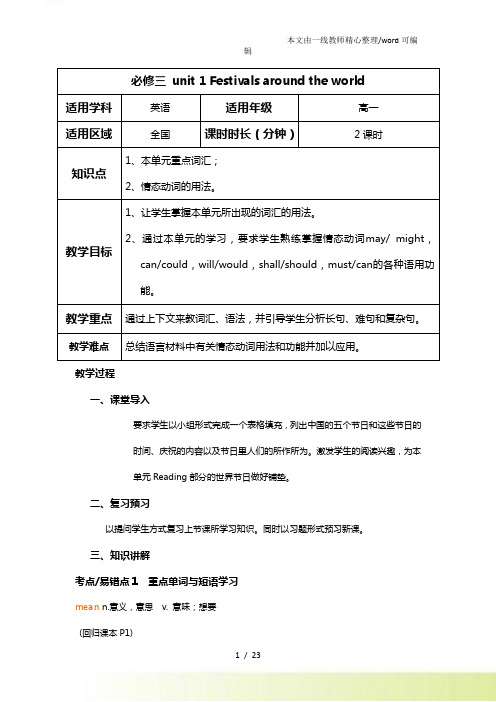
必修三unit 1 Festivals around the world 适用学科英语适用年级高一适用区域全国课时时长(分钟)2课时知识点1、本单元重点词汇;2、情态动词的用法。
教学目标1、让学生掌握本单元所出现的词汇的用法。
2、通过本单元的学习,要求学生熟练掌握情态动词may/ might,can/could,will/would,shall/should,must/can的各种语用功能。
教学重点通过上下文来教词汇、语法,并引导学生分析长句、难句和复杂句。
教学难点总结语言材料中有关情态动词用法和功能并加以应用。
教学过程一、课堂导入要求学生以小组形式完成一个表格填充,列出中国的五个节日和这些节日的时间、庆祝的内容以及节日里人们的所作所为。
激发学生的阅读兴趣,为本单元Reading部分的世界节日做好铺垫。
二、复习预习以提问学生方式复习上节课所学习知识。
同时以习题形式预习新课。
三、知识讲解考点/易错点1 重点单词与短语学习mean n.意义,意思v. 意味;想要(回归课本P1)Festivals are meant to celebrate important times of year.[归纳拓展]mean to do 打算做某事be meant to do 被要求做…mean doing 意味着….eg. I never meant him to work for us.Passing the entrance examination means being admitted into college.take place发生(回归课本P1)Discuss when they take place, what they celebrate and what people do at that time. [归纳拓展] take place/happen/occur/break out/come about(1)take place 其“发生”是按意图或计划进行,无偶然性,无被动语态。
高中英语必修三unit1教学设计

高中英语必修三unit1教学设计一、教学任务及对象1、教学任务本教学设计针对的是高中英语必修三中的Unit 1,该单元主要围绕“Festivals around the world”这一主题展开。
教学任务包括引导学生了解和掌握世界各地节日的历史背景、庆祝方式以及相关的文化内涵;提高学生的英语听、说、读、写四项基本技能;培养学生跨文化交际意识和能力,激发他们对英语学习的兴趣和热情。
2、教学对象本教学设计的教学对象为高中一年级学生,他们已经具备一定的英语基础,能够使用简单的英语进行日常交流,但在词汇、语法、阅读和写作方面还有待提高。
此外,这个年龄段的学生对新鲜事物充满好奇,有较强的求知欲和表现欲,这为教学活动的开展提供了有利条件。
但同时,学生们的学习能力和英语水平存在一定差异,因此在教学过程中,教师需要关注每个学生的个体差异,因材施教,使他们在原有基础上得到提高。
二、教学目标1、知识与技能(1)了解并掌握与“Festivals around the world”相关的词汇、短语和句型,如:custom, ritual, celebrate, origin, traditional, etc.(2)提高学生的英语阅读理解能力,能够快速捕捉文章主旨,掌握文章细节信息,并对文章进行合理推断。
(3)培养学生的英语听力技巧,能听懂关于世界各地节日的英语对话和短文,提高获取关键信息的准确性。
(4)提高学生的英语口语表达能力,能够运用所学知识进行关于节日的讨论和交流,发表自己的观点和看法。
(5)锻炼学生的英语写作能力,能撰写关于节日的小短文,介绍节日的起源、庆祝活动等。
2、过程与方法(1)通过小组合作、讨论、分享等方式,让学生在互动交流中学习英语,提高他们的合作能力和沟通能力。
(2)运用多媒体教学资源,如视频、图片、音频等,为学生提供丰富的教学情境,激发学生的学习兴趣。
(3)采用任务型教学法,引导学生完成各种听说读写任务,提高学生的实际运用能力。
【——人教版高一英语】必修三unit1教案
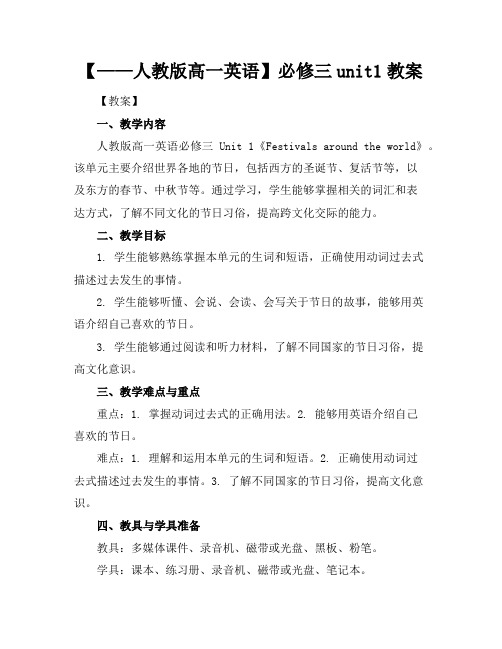
【——人教版高一英语】必修三unit1教案【教案】一、教学内容人教版高一英语必修三Unit 1《Festivals around the world》。
该单元主要介绍世界各地的节日,包括西方的圣诞节、复活节等,以及东方的春节、中秋节等。
通过学习,学生能够掌握相关的词汇和表达方式,了解不同文化的节日习俗,提高跨文化交际的能力。
二、教学目标1. 学生能够熟练掌握本单元的生词和短语,正确使用动词过去式描述过去发生的事情。
2. 学生能够听懂、会说、会读、会写关于节日的故事,能够用英语介绍自己喜欢的节日。
3. 学生能够通过阅读和听力材料,了解不同国家的节日习俗,提高文化意识。
三、教学难点与重点重点:1. 掌握动词过去式的正确用法。
2. 能够用英语介绍自己喜欢的节日。
难点:1. 理解和运用本单元的生词和短语。
2. 正确使用动词过去式描述过去发生的事情。
3. 了解不同国家的节日习俗,提高文化意识。
四、教具与学具准备教具:多媒体课件、录音机、磁带或光盘、黑板、粉笔。
学具:课本、练习册、录音机、磁带或光盘、笔记本。
五、教学过程1. 情景引入(5分钟)教师通过向学生提问:“你们最喜欢的节日是什么?为什么?”来引出本课的主题。
学生可以自由发言,分享自己喜欢的节日和原因。
教师引导学生用英语进行表达,同时板书关键词“festival”和“celebrate”。
2. 课堂讲解(15分钟)教师带领学生学习本课的生词和短语,如“Christmas”、“Easter”、“Spring Festival”等,并通过例句解释其用法。
接着,教师讲解动词过去式的正确用法,并通过练习题让学生进行随堂练习。
3. 听力训练(10分钟)教师播放课文中的听力材料,学生边听边做练习。
听力材料内容包括不同国家的节日习俗。
听后,教师提问学生关于听力材料的问题,检查学生对听力内容的理解。
4. 阅读理解(10分钟)教师分发课文阅读材料,学生独立阅读,并回答相关问题。
【——人教版高一英语】必修三unit1教案
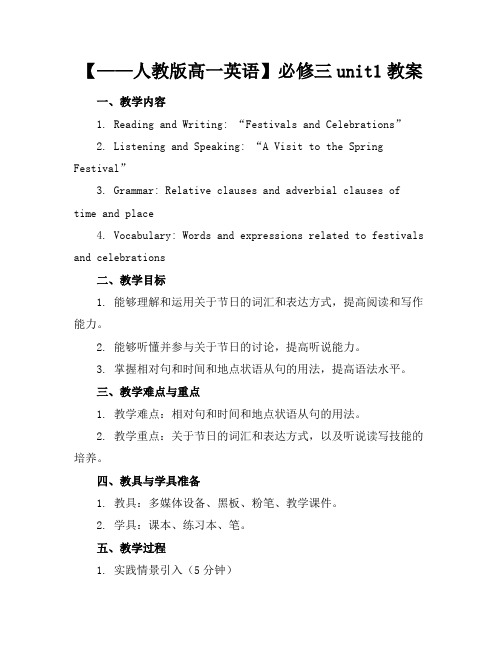
【——人教版高一英语】必修三unit1教案一、教学内容1. Reading and Writing: “Festivals and Celebrations”2. Listening and Speaking: “A Visit to the Spring Festival”3. Grammar: Relative clauses and adverbial clauses of time and place4. Vocabulary: Words and expressions related to festivals and celebrations二、教学目标1. 能够理解和运用关于节日的词汇和表达方式,提高阅读和写作能力。
2. 能够听懂并参与关于节日的讨论,提高听说能力。
3. 掌握相对句和时间和地点状语从句的用法,提高语法水平。
三、教学难点与重点1. 教学难点:相对句和时间和地点状语从句的用法。
2. 教学重点:关于节日的词汇和表达方式,以及听说读写技能的培养。
四、教具与学具准备1. 教具:多媒体设备、黑板、粉笔、教学课件。
2. 学具:课本、练习本、笔。
五、教学过程1. 实践情景引入(5分钟)利用多媒体展示世界各地节日的图片,引导学生谈论他们所了解的节日,激发兴趣。
2. 阅读与写作(20分钟)1)学生阅读“Festivals and Celebrations”部分,理解文章大意。
2)教师讲解关于节日的词汇和表达方式,并指导学生进行写作练习。
3. 听力与口语(20分钟)1)学生听“Spring Festival”的对话,回答相关问题。
2)教师组织学生进行小组讨论,分享他们最喜欢的节日。
4. 语法讲解(15分钟)1)教师讲解相对句和时间和地点状语从句的用法。
2)学生进行语法练习,巩固所学知识。
5. 随堂练习(10分钟)学生完成课堂练习,检测对本节课知识点的掌握情况。
六、板书设计1. 关于节日的词汇和表达方式2. 相对句和时间和地点状语从句的用法3. 课堂练习答案七、作业设计1. 作业题目:1)根据课堂所学,写一篇关于你最喜欢的节日的短文。
- 1、下载文档前请自行甄别文档内容的完整性,平台不提供额外的编辑、内容补充、找答案等附加服务。
- 2、"仅部分预览"的文档,不可在线预览部分如存在完整性等问题,可反馈申请退款(可完整预览的文档不适用该条件!)。
- 3、如文档侵犯您的权益,请联系客服反馈,我们会尽快为您处理(人工客服工作时间:9:00-18:30)。
GrammarTeaching Goals: 1. To check what has been learned yesterday.2. To enable Ss to master some new words and expressions.3. To get Ss to have knowledge of the grammar point: the model verb Teaching Procedures:Step 1. Revision1. Ask Some Ss to retell the reading text.2. Ask Ss to answer the following question to see whether they did their homework or not.How many festivals are mentioned in our text?Step 2. Word studyPurpose: To consolidate the words and phrases in the text.Finish Ex1Purpose: To enable Ss to master some new words and expressions.Ex2 Many people think that Christmas is a western __________, but in fact it is really a worldwide holiday. Christmas actually as a _______ festival celebrated by _________ around the world. Its ______ is around the 3rd or 4th century AD, when the _______ of remembering Jesus’ birth on December 25th first started. Today, of course, many people celebrate Christmas __________ it were just a holiday to ______________ family, rather than a holiday about a _______.Suggested Answers:celebration, religious, Christians, origin, custom, as though, have a fun with, beliefStep 3. Grammar point1. Explain for Ss the grammar point: the modal verb(1) can/could 可以表示能力、许诺、请求或某种可能性,could还可用于:①提出委婉的请求,(注意在回答中不可用could)。
例如:—Could I have the television on? 我能看电视吗?—Yes, you can. / No, you can't. 可以/不可以。
②在否定句、疑问句中表示推测或怀疑。
例如:He couldn't be a bad man. 他不大可能是坏人(2) may/might 表示允许或请求;表示没有把握的推测;may 放在句首,表示祝愿。
might 表示推测时,不表示时态,只是可能性比may 小。
(3) will/would 克表示请求、许诺、同意、过去的习惯等。
但需要注意:①would like;would like to do = want to 想要,为固定搭配。
例如:Would you like to go with me? 想和我一块去吗?②Will you…?Would you like…? 表示肯定含义的请求劝说时,疑问句中一般用some,而不是any。
例如:Would you like some cake? 吃点蛋糕吧。
③否定结构中用will,一般不用would, won't you是一种委婉语气。
Won't you sit down? 你不坐下吗?(4) shall/should可以表示推测、判断或建议。
shall指现在,should指过去。
(5) must/can’t指推测或猜想must用在肯定句中表示较有把握的推测,意为“一定”,否定推测用can't。
2. Ask Ss to find at least four sentences which use modal verbs in the reading text and translate them into Chinese. See who can make the best translation.Suggested Answers:(1)… when they can dress up and go to their neighbors’ homes and ask for sweets. (line 9, part 2)那时他们可以化装并去邻居家要糖果。
(2)Some people might win awards for their , …(line 4, part 4)一些人可能会因他们的……而获奖。
(3)… and may give children lucky money in red paper. (line 3, part 5)也可能给孩子们用红包包起来的压岁钱。
3. Ask Ss to finish Ex3 on P6 and check the answers in pairs.Step 4. Homework1.Ask Ss to review what has been learned in this period.2.Ask Ss to finish the exercises of Using Words And Expressions and Using Structures onP42~P43.语法教学参考材料:情态动词的语法特征1)情态动词不能单独做谓语,除ought 和have 外,后面只能接不带to 的不定式。
2)情态动词没有人称,数的变化,但有些情态动词,如can、will也有一般式和过去式的变化。
3)情态动词的“时态”形式并不是时间区别的主要标志,不少情况下,情态动词的现在式形式和过去式形式都可用来表示现在时间、过去时间和将来时间。
1) can 和could:1) can的主要用法是: A. 表示体力或脑力的能力:eg. The girl can dance very well.B. 表示说话的推测﹑事物的可能性等: eg. Can the news be true?C. 在口语中, can可以表示请求或允许: eg. Can I sit here?2) could的主要用法是:A. could 是can的过去式, 表示与过去有关的能力和推测: eg. We all knew that the young man couldn’t be a doctor.B. could可以代替can表示请求, 但语气较can客气、委婉:eg. Could you lend me your dictionary? Could I use your bike?3) can和could接动词的完成形式,表示可能已经做某事。
can用在否定和疑问句中, 表示不相信、怀疑等态度。
eg. They can't have gone out because the light is still on.may 和might :may 常用来表示: A. 表示请求、允许;比can较为正式: eg. May I come in ? You may go now.B. 表示说话人的猜测: “也许” “可能”: 通常只用于肯定句和否定句中。
eg. --I believe the man is from England. --But I may be wrong.The guest may arrive this afternoon.在肯定句中,may 的可能性比can 高,may 表示现实的可能性,can 表示理论上的可能性。
如:The road may be blocked. 这条路可能不通了。
The road can be blocked. 这条路可能会是不通的。
在疑问句中,表示可能性用can。
如:Where can he be? 他会在哪呢?C. 表示祝愿;但语气较正式: eg. May you succeed! May you have a good journey!might 的用法有: 多在间接引语中表示过去的可能和允许。
如:She said that he might take her bike. 她说他可以拿她的自行车去用。
除了在间接引语中以外,might 一般不表示过去的可能或者许可。
如要表示过去的可能可以用could, 表示过去的许可可以用was( were) allowed to 或者had permission to 。
表示现在的可能,其可能性要比may 小。
如:She might go home tomorrow.表示现在的许可, 语气比may 较委婉, 一般用于疑问句(包括间接疑问句), 不可用于肯定句或者否定句。
如: Might I have a word with you? 我可以和你说句话吗?will和would:1. will是助动词或是情态动词?will用于构成将来时是助动词。
用于表示“意志”“决心”“请求”是情态动词。
would亦同理。
eg. I will tell you something important. 我要告诉你一些重要的事。
(助动词)Will you tell her that I'm here? 请您告诉她说我在这儿,好吗?(情态动词) 2. 在疑问句中用于第二人称,提出请求或询问。
eg: If you want help - let me know, will you? 如果你需要帮助, 让我知道, 好吗? Will you type this, please?请打印这个,好吗?Won't you sit down?请坐下,好吗?3. would比will客气委婉。
eg: Would you help us, please? 请您帮助我们,好吗?I’d go there with you.我要和你一块到那儿去。
